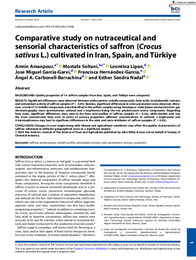Title:
Comparative study on nutraceutical andsensorial characteristics of saffron (Crocussativus L.) cultivated in Iran, Spain, and Türkiye |
Authors:
Hernández, Francisca 
Amanpour, Armin 
Soltani, Mostafa
Lipan, Leontina 
GARCÍA GARVÍ, JOSE MIGUEL 
Carbonell-Barrachina, Ángel A.
Sendra Nadal, Esther |
Editor:
Wiley |
Department:
Departamentos de la UMH::Producción Vegetal y Microbiología |
Issue Date:
2024-01 |
URI:
https://hdl.handle.net/11000/32390 |
Abstract:
BACKGROUND: Quality properties of 14 saffron samples from Iran, Spain, and Türkiye were compared.RESULTS: Significant differences were observed between anthocyanins, volatile compounds, fatty acids, total phenolic content,and antioxidant activity of saffron samples (P < 0.05). Besides, significant differences in color parameters were observed. More-over, a total of 13 volatile compounds were identified in the saffron samples using. headspace–solid-phase microextraction–gaschromatography–mass spectrometry, safranal and ⊍-isophorone being the two predominant aroma compounds. Regardingfatty acids, significant differences were seen in the fatty acid profiles of saffron samples (P < 0.05), while linoleic acid wasthe most concentrated fatty acid. In terms of sensory properties, different concentrations of safranal, ⊍-isophorone and4-ketoisophorone may lead to significant differences in the odor and taste attributes of saffron samples (P < 0.05).CONCLUSION: Changes in corm origin along with climate and agricultural conditions may affect the quality characteristics ofsaffron cultivated in different geographical areas to a significant degree.
|
Keywords/Subjects:
saffron
anthocyanins
volatile profile
antioxidant activity
color parameters
sensory properties |
Knowledge area:
CDU: Ciencias aplicadas: Agricultura. Silvicultura. Zootecnia. Caza. Pesca |
Type of document:
info:eu-repo/semantics/article |
Access rights:
info:eu-repo/semantics/openAccess |
DOI:
https://doi.org/10.1002/jsfa.13594 |
Published in:
Journal of The Science of Food and Agriculture; 2024 |
Appears in Collections:
Artículos - Producción vegetal y microbiología
|

.png)
